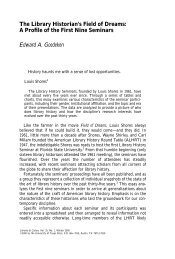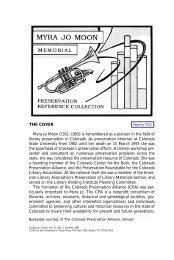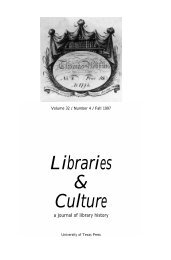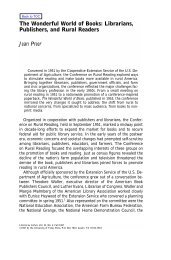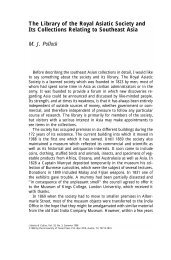Full issue (pdf file, 973 kb) - School of Information - The University of ...
Full issue (pdf file, 973 kb) - School of Information - The University of ...
Full issue (pdf file, 973 kb) - School of Information - The University of ...
You also want an ePaper? Increase the reach of your titles
YUMPU automatically turns print PDFs into web optimized ePapers that Google loves.
Louis Shores and Library History<br />
Lee Shiflett<br />
Together with Wayne Shirley, Louis Shores began the American Library<br />
History Round Table in 1947. With the addition <strong>of</strong> N. Orwin Rush and John<br />
David Marshall, they dominated its proceedings for the first two decades.<br />
When Shores and Shirley turned over the control <strong>of</strong> the Round Table to<br />
Shore’s appointed successor, Michael H. Harris, and his democratically<br />
elected successors in 1972, the four founders left an organization that,<br />
though small, was popular and had focused the agenda <strong>of</strong> library history.<br />
<strong>The</strong> two keynote papers <strong>of</strong> the American Library History Round Table<br />
(ALHRT), those delivered by Louis Shores in San Francisco in 1947 and<br />
Stanley Pargellis at ALA Midwinter in Chicago in 1948, differ in details<br />
but share a common vision for the new round table. It should construct a<br />
history that could elevate the pr<strong>of</strong>essional consciousness <strong>of</strong> librarians.<br />
For Shores it was “the chronicling <strong>of</strong> our pr<strong>of</strong>essional achievement as<br />
manifested in the ever increasing dissemination <strong>of</strong> good ideas through<br />
libraries.” 1 To Pargellis it was the possibility that “librarians can take<br />
inspiration from the lives and achievements <strong>of</strong> the great librarians <strong>of</strong> the<br />
past.” 2 Shores and Pargellis shared a common perspective on history—a<br />
conservative position that both, in their original statements, directly contrasted<br />
to history as a social science. For them, the purpose <strong>of</strong> library history<br />
was to impress upon librarians the greatness <strong>of</strong> the pr<strong>of</strong>ession’s past<br />
leaders and to celebrate the importance <strong>of</strong> libraries in American society.<br />
Facts, dates, and data were not the materials from which history and<br />
libraries derived meaning. <strong>The</strong>y called for a history that commemorated<br />
rather than criticized and that inspired rather than informed. To be fair,<br />
it must be added that Pargellis allowed for “room in Clio’s pastures for<br />
every kind <strong>of</strong> animal, even social scientist’s history,” and Shores himself,<br />
while refusing to allow that degree <strong>of</strong> liberality, never insisted on any<br />
orthodoxy among the participants in the meetings <strong>of</strong> the ALHRT. It was<br />
sufficient that they shared his enthusiasm for history and libraries.<br />
Indeed, through the first twenty-five years <strong>of</strong> the ALHRT, Shores took<br />
delight in presentations that focused on the foibles and failures <strong>of</strong> the<br />
great librarians and always took greater delight in a well-told tale than<br />
in an appropriate moral.<br />
Libraries & Culture, Vol. 35, No. 1, Winter 2000<br />
2000 by the <strong>University</strong> <strong>of</strong> Texas Press, P.O. Box 7819, Austin, TX 78713-7819



